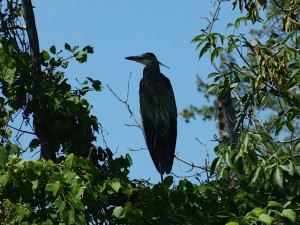This photo was taken on September 1, 2015 at Tuttle Marsh by Jean Howard, AVA member. Click on the photo for a larger view.
Thank you Jean!
Thank you Jean!
The AuSable Valley Audubon’s new season schedule of meetings and field trips is now available. You may view, print or download a copy of the schedule (it’s in two parts) via these links: 2015-2016 AVA Program and 2015-2016 AVA schedule contact info. These files are in PDF format, so you will need a copy of Adobe Reader to view them.
The Spotted Knapweed patrol posts our final message for the Pulling Together project…Spotted Knapweed 2015.
The following is the final letter to Chuck Allen, manager of the Tawas Point State Park and the pullers who worked through the weather, sweat, and aches and pains to remove the noxious plant, Spotted Knapweed. Tuesday, August 18 was our last day of pulling. Following this letter, please note Chuck Allen’s thankful response.
Hello all (Chuck as well as Judy, Bob, Larry, Sue, and Gary)
As we draw the 2015 Spotted Knapweed pulling season to a close, I cannot brag enough about your (our) efforts. You are such a hard working small group!!! If I didn’t say it enough this year…thank you, thank you, thank you. Your reward is in the value that we added to the Tawas Point State Park by removing this noxious weed and by spending time educating folks about SN.
Today’s pullers were: Judy LaPorte, Bob Kemnitz, Larry VanWagoner, Sue Duncan, Gary and Donette Spiekerman. Four of us pulled on the bayside of Sandy Hook trail and we got quite far along. Sue worked on the beachside of Sandy Hook and Larry continued his work in the lawns. Six pullers worked 13 hours, removed 14 bags which weighed 136 lbs. Total poundage removed this season is 975 lbs and total volunteer hours worked is 90.5. Continue reading
The field trip to Shiawasee National Wildlife Refuge followed by a tasty lunch at the Savoy in Saginaw on Thursday, July 23, 2015 was greatly enjoyed by the four AVA members Larry, Sue, Eugenia and Kathy.
A total of 27 bird species were identified, along with a few mammals. A few unknowns were also spotted: duck and sparrow species. Of particular enjoyment were the abundant Great Egret and Great Blue Heron. A surprise sighting was also in store near the auto drive tour end. This bird was about 30 feet up! Amazingly fun ending to an interesting drive.
This wonderful video and narrative was provided by AVA member Larry VanWagoner. His wife, Sue lead the field trip to the Red-headed Woodpecker area during the Tawas Point Birding Festival this past May.
“Please find attached a video I took on 6/25 at the Red-headed Woodpecker habitat on the SW end of Sand Lake.
I used a point-and-shoot camera attached to my spotting scope. The scope/camera was mounted on a tripod head that was clamped to my vehicle window. I used the vehicle as a ‘blind’ . This allowed me to approach to within about 50 m to photograph the birds.
Earlier in the week Sue and I found the nest by sitting in the forest and watching for adult RHWO to visit the same tree repeatedly. These birds with their black and white coloring that ‘flashes’ when they fly are very easy to spot against a green forest background.
There were only two chicks in this nest.
When I visited the nest two days after taking this video, this nest was empty, and the adults were bringing food to places out of sight, high in the surrounding trees.
In my experience, Red-headed Woodpeckers feed their chicks only insects. The adults frequently are found setting on the sides of trees observing their surroundings. Then, they will swoop to the ground to grab an insect, which they may immediately take to their chicks. Other times, they’ll wait until they have captured more than one insect before taking them to the brood.
While adult RHWO have a totally red head down to their shoulders, with white chest, black back, and black and white wings. Both sexes look identical. Fledglings have a greyish- brown head, and a whitish-grey back and front. The young fledglings have a call distinctly different from the adults.
Many RHWO around Sand Lake seem to spend the winter here. In the winter, they appear to eat acorns they have stashed in ‘larder trees’. On the coldest of winter days, Sue and I find these birds clinging to the sunlit sides of trees with multiple woodpecker holes.
Sue and I counted 54 adults Red-headed Woodpeckers in the area around Sand Lake one very cold but sunny day in late February 2015.”
On June 11, 2015, National Audubon Society conducted a survey of the Black Tern population at Tawas Lake.
The following text is from the eBird checklist submitted by Caleb Putnam, Audubon. All photos are by courtesy of Roger Erikkson. Follow the jump for Caleb’s report and more photos. Continue reading